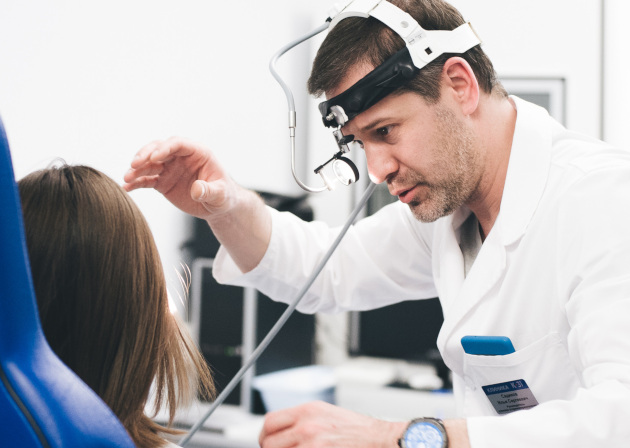Nasal rinsing using the Proetz method

specialists

equipment

treatment
The effectiveness of operations on the soft palate for snoring

Uvulopalatoplasty is a surgical procedure aimed at correcting the structures of the soft palate, including the uvula, to eliminate or reduce the intensity of snoring and treat mild forms of obstructive sleep apnea. The surgery involves removing or reshaping excess soft tissue in the throat area to help widen the airways and reduce tissue vibration during sleep.
Surgical interventions on the soft palate began to be performed in the mid-20th century.
Criteria for uvulopalatoplasty

Uvulopalatoplasty is recommended for those who experience snoring that is not associated with obstructive sleep apnea. Snoring usually signals other health problems, including vibration of the soft tissue in the throat area. May be caused by smoking, excess weight, enlarged tonsils, or difficulty breathing through the nose.
The operation is indicated for those who have mild forms, no obesity, no inflammatory processes in the respiratory tract and have been examined by polysomnography, thus excluding obstructive sleep apnea syndrome. In such cases, uvulopalatoplasty may be effective.

Limitations of the effectiveness of uvulopalatoplasty
- Overweight
- Anomalies of the structure of the lower part of the face
- Smoking habit, reflux or thyroid problems
- Decreased tone of the pharyngeal muscles
General information about the procedure

How is an appointment with an otolaryngologist at K+31?
Our doctors
Make an appointment at a convenient time on the nearest date

This award is given to clinics with the highest ratings according to user ratings, a large number of requests from this site, and in the absence of critical violations.

This award is given to clinics with the highest ratings according to user ratings. It means that the place is known, loved, and definitely worth visiting.

The ProDoctors portal collected 500 thousand reviews, compiled a rating of doctors based on them and awarded the best. We are proud that our doctors are among those awarded.
Price








































At the service
Snoring occurs in the throat area, which often refers people to an ENT specialist. Many believe that the solution to the problem lies here. Otolaryngologists often suggest uvulopalatoplasty, as the operation eliminates snoring.
The procedure is considered relatively simple: it is performed on an outpatient basis under local anesthesia and is inexpensive. During the operation, part of the soft palate and uvula are removed, which widens the airways. Sometimes additional manipulations are performed to reduce tissue mobility in this area.
After uvulopalatoplasty, the space for breathing increases, soft structures become less mobile, which theoretically should eliminate snoring. However, in practice, the success of the method is not guaranteed, especially with severe obstructive apnea.